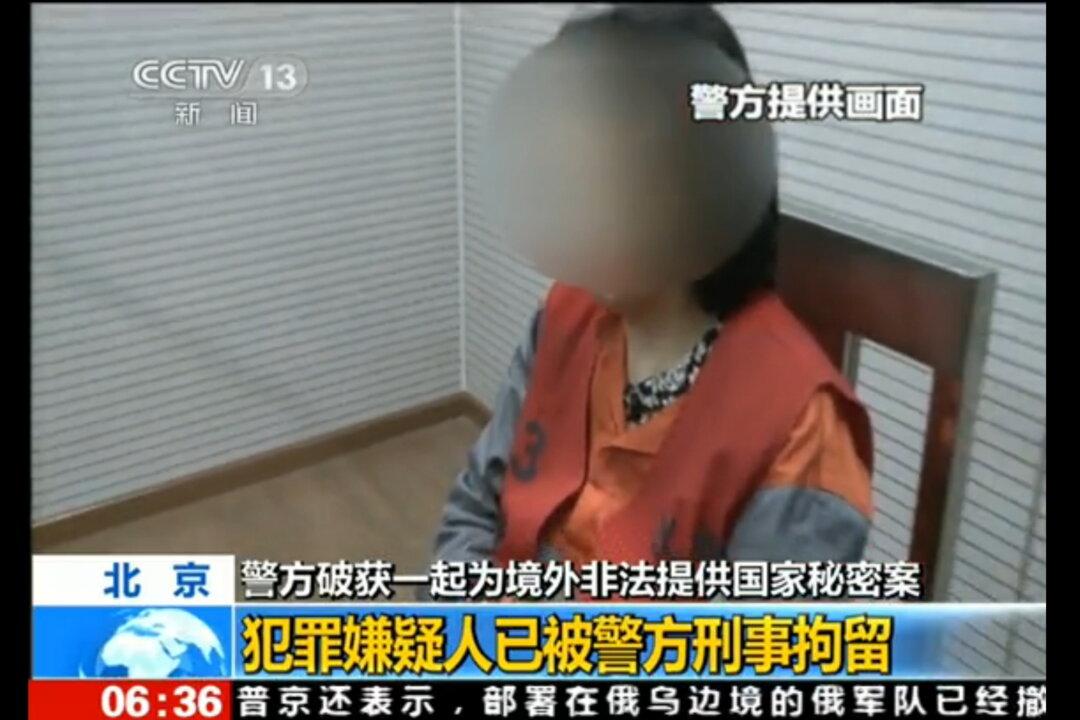Gao Yu, a well-known veteran Chinese journalist, who has been missing for half a month, was recently paraded onto China’s national state broadcaster and filmed sitting in a police station pleading guilt to crimes and asking for punishment from the state.
Gao is being accused of leaking state secrets to overseas media channels. The May 8 broadcast has concerned many observers, inside and outside China, with the methods taken by the authorities to stifle dissent.
Beijing police arrested the 70-year-old Gao on April 24, under the orders of a special task force established in Beijing after a “central confidential document” was published on an overseas website last August, according to the Party mouthpiece Xinhua.
Gao pleaded guilty to obtaining and passing on that secret document, an action she said she “deeply regrets” and for which she is “willing to accept legal punishment.” She was said to have obtained the document last June, typed it into her computer, and then emailed it overseas, the report said.
Gao was shown being led into a small, enclosed police room, wearing an orange prisoner vest where she made her confession. Her face was blurred out for some reason.
“I think what I did touched upon the law, and harmed the interests of the state,” she said, while nervously rubbing her hands together. “It was very wrong.” The police nod their heads sternly. “I sincerely accept the lesson and plead guilty,” she said.
No official reports have clarified what the leaked document was, but it bears a very close resemblance to the infamous “Document No. 9,” reported widely last year.
“Document No. 9,” published by the Hong Kong-based Ming Jing media group in August of last year, transmitted new ideological directives from the Chinese Communist Party’s Central Propaganda Department. It required Chinese universities to stay away from seven topics including universal values, press freedom, citizen rights, civil society, the Communist Party’s historical mistakes, judicial independence, and “the bourgeois elite.”
Observers of the Chinese political system saw the document, and the campaign that accompanied it, as historical regression.
No official reports have fully explained “Document No. 9,” but some local government websites appeared to discuss it in May of last year. Though the news items were later purged, a screenshot of a circular announcing that officials at the Rural Construction Committee of Chongqing City studied the document was preserved on the Internet.
Aside from the secretive nature of the document, political analysts see the arrest and punishment of Gao Yu as an open attack on the press in China. Bao Tong, a former policy adviser to the reformist Party leader Zhao Ziyang, ousted during the Tiananmen turmoil of 1989, said that there were a number of “bizarre things” about the accusations against Gao.
“If collecting and delivering information is guilty, why does journalism exist?” Bao Tong asked.
Gao has worked in the media industry in China since 1979, and has twice been sentenced to prison for her work. The first instance was on June 3, 1989, when she was arrested and detained for more than a year for her reporting on the student movement leading up to the massacre of June 3 and 4.
Then in October 1993, Gao was arrested again and sentenced six years in prison for “publishing state secrets.” In February 1999, she was given parole due to poor health. She has won a number of international journalism awards, including the Golden Pen of Freedom, Courage in Journalism Award from the International Women’s Media Foundation, the Guillermo Cano World Press Freedom Prize, and others.
Some of Gao’s work has brought intense controversy outside China. In a column for Deutsche Welle’s online Chinese edition in January of this year, Gao wrote that a secretive security task force inside the Communist Party in 2012 “sent materials to Bloomberg News about every standing committee member” except two. Bloomberg later that year published revelations, purporting to be based on publicly available documents, about the wealth of the Xi Jinping family.
The use of forced confessions aired on television was widely used during the Cultural Revolution of the 1960s and 1970s, and many Chinese intellectuals have compared the treatment of Gao Yu and others to those days. The method is used by the Party both to humiliate the individual in question, and also to warn others from committing the same acts.
Others targeted in a similar manner include Charles Xue, a Chinese-American entrepreneur and angel investor, known by the screen name of Xue Manzi. While in detention last September he was forced to confess to visiting prostitutes. Xue had gained a reputation for his sharp speech criticizing the Communist Party, and for the millions of online followers he had amassed. He called for free speech and democracy in China.
Chen Yongzhou, a reporter at a newspaper in Guangzhou, was also hauled onto China Central Television to admit to taking bribes for reporting “fake news” about alleged corruption at the state-owned construction equipment manufacturing enterprise Zoomlion. Before Chen had gone to trial he had been made to confess to his crimes on national television, an ordering of events that lawyers in China took exception to.




